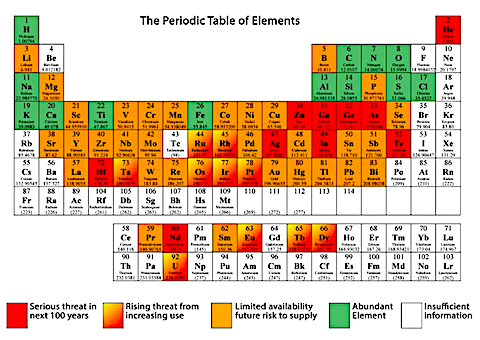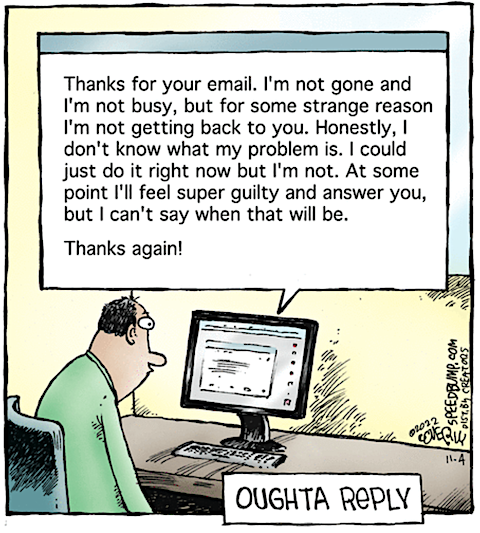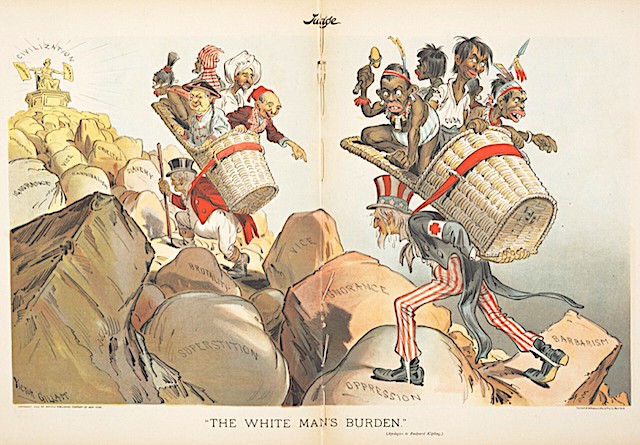
New Yorker cartoon by Paul Noth
I’ve had several people tell me they can no longer bear to read the politics and economics and ‘collapse watch’ sections of these links posts — they find them too infuriating and depressing. They’re also largely unactionable news. So why post them at all? Mainly because I find it useful to remind myself how we are all just products of our conditioning, and that even the most level-headed and ‘reasonable’ among us can be conditioned to believe and to do almost anything.
As I start to understand how people’s conditioning can lead them to believe absurd things and to commit atrocious acts, and therefore why they believe and do these things, I can at least be philosophical about where all this is taking us. I don’t believe civilization’s collapse is avoidable (that’s my conditioning), but I do get some comfort from understanding collapse’s inevitability. That is why I am a chronicler, I suppose, and not an activist. Not that I have any choice.
COLLAPSE WATCH

source: Report On Critical Raw Materials For The EU May 2014, via Geological Survey of Finland, which concludes: “Global reserves are not large enough to supply enough metals to build the renewable non-fossil fuels industrial system.” Via Richard Heinberg’s Museletter
Oil & gas industry carbon emissions 3x higher than industry admits: Satellites reveal most industries are conveniently underestimating their CO2e emissions. Thanks to John Whiting for the link.
Exponential math tells the story: Doubling resource extraction, doubling industrial production, doubling waste, halving the time left before total collapse. As usual, Richard’s entire Museletter is worth a read.
Climate scientists still spout ‘there’s still time’ rhetoric, letting the rest of us live in denial: Only by acknowledging the inevitability of ecological and climate collapse can we genuinely start preparing for it. Thanks to Paul Heft for the link.
LIVING BETTER

electric scooter, commercial model, 1901
Protesters using a blank poster to tell their story: The blank protest sign says it all: “You know what’s wrong. You know why we can’t say it in public”. When you get to fill in the blank, how can you disagree?
Profiling public figures honestly: Lyz explains how to research and produce useful profiles of people in power.
Why Michael Moore out-predicts the pollsters: He listens to young and women voters. Thanks to John Whiting for the link and the one that follows.
Vienna models how to solve the housing crisis: Quality, subsidized public housing forces down private industry price-gouging.
… and Houston, of all places, follows suit: Same answer: Government initiatives create an abundance of affordable homes; problem solved.
Disillusioning: That, says Caitlin Johnstone, is the real job of the journalist.
POLITICS AND ECONOMICS AS USUAL

Dilbert, by Scott Adams
The case for peace in Ukraine: Naked Capitalism outlines the eight reasons for all sides to pursue an immediate ceasefire and peace talks.
Corpocracy, Imperialism & Fascism: Short takes (thanks to John Whiting for several of these links):
- Does anyone really believe the recent right-wing overthrow of Peru’s president and Argentina’s VP doesn’t have the CIA’s fingerprints all over it?
- Palestinians’ struggle for survival is being sabotaged worldwide by the Apartheid Israeli state’s falsely equating BDS with anti-semitism. In Britain particularly, “anti-semitism” is being weaponized as a tool to defame and defeat leftists who threaten the status quo.
- The US military has “advise and assist” agreements allowing it to interfere, under the radar, in internal politics in more than 50 countries
- AOC Squad defends Ukraine war and attacks socialist critics
- Bank of Canada “declares class war on working people”
- US ‘defense’ industry admits using Ukraine as testing ground for new weapons
- Britain’s new Public Order Bill is “the most repressive legislation of the modern era”
- BC’s government ignores report on massive safety, cost and ecological problems with Site C mega-dam project
- Biden supports immunity for MBS in murder of Khashoggi
- US sanctions against Iran’s people hurt, not help, protests
- US is profiting hugely from Ukraine war, as Europe suffers the consequences. Thanks to Paul Heft for the link.
- Brexit turns to ‘Bregret’ as UK economy is in free-fall
- The Republicans’ “Two Santa Clauses” policy is bankrupting the US
- Rampant use of Non-Disclosure Agreements (many of them illegal) enables corruption and abuse in the workplace
- Biden’s Canadian toady Trudeau prohibits ministers from disclosing why they’re blocking aid to Afghanistan’s starving
- Canada-US Keystone pipeline leaks 14,000 barrels of oil into waterways before anyone notices
Propaganda, Censorship, Misinformation and Disinformation: Short takes:
- The true rate of inflation is more like 17%.
- Government hate- and war-mongering campaigns against China, Russia and Iran are working
- Trudeau propagates misinformation about Iran’s regime
- As the truth about the missile hitting Poland comes out, the credibility of media blindly repeating Ukrainian information ministry talking points is starting to tank
- The once-respectable New Yorker and Atlantic descend to Faux News’-level journalism, with a hatchet job on a respected historian and a call for all-out war on Russia (and China)
- Laughable both-sides-ing by the CBC, determined not to state the obvious. “Whoever is behind this should stop immediately”. Uh huh.
- The Guardian’s endless assault on the truth about Julian Assange.
- When truth no longer matters: the decline of the mainstream media
CoVid-19 Corner: Short takes:
- In Canada as elsewhere, public health leaders increasingly capitulate to political ‘leaders’ opposing continuing protections against the pandemic, even as doctors and researchers on the front lines urge the opposite.
- The China protests against zero-tolerance CoVid-19 programs are being misrepresented as opposition to the Chinese government.
- It looks like reinfections are worse, on average, than first infections.
FUN AND INSPIRATION

Dave Coverly’s Speed Bump
The Wyrd Sisters get a MMIWG remake: The awesome Kim Baryluk a cappella song Warrior, sung by two Newfoundland women’s choirs with First Nations drummer (thanks to David Cousins for the correction on the origin of the choirs).
The fraud of “exit option democracy”: “If you don’t like it, why don’t you just leave?” But, of course, it’s not that simple. Unless you actually do leave. Maybe they only want us to believe it’s that difficult. Thanks to Euan Semple for the link.
Lyz’s hilarious Blue Check Carnival experience: The lighter side of the Twitter debacle, showing what a good spoof can produce. Also check out Indrajit Samarajiva’s post for more great parodies.
When it hurts to ask: A fascinating look into the psychology of giving and receiving, and why we hesitate to ask for what we want or need. Thanks to the Naked Capitalist for the link.
Is nuclear power that dangerous?: In a two-part video, Sabine Hossenfelder compares the dangers of nuclear energy to those of other forms of energy and other chemical dangers. and then goes on to discuss the problem of nuclear waste. She’s not a particular fan of nukes (“They certainly won’t solve the energy crisis”) but she says we have much greater dangers and risks that need focusing on. To my surprise, I was, at least for now, persuaded. It is possible to change your beliefs, even at my old age.
How electron microscopes work: A close-up look at the intricacies of trying to see individual atoms using electron microscopes.
The musical Rogers family: Canada’s legendary folk family has produced some astonishing music. Here’s Stan doing Three Fishers, based on a poem written in 1851. And son Nathan doing what should be Canada’s national anthem, Northwest Passage.
Vancouver tramcar trip, 1907: Using new digitizing techniques to sharpen the image and adding false colour and sound, a trip down the main streets of Vancouver 115 years ago comes to life.
Flying squirrels: A look into how these (not really) flying creatures manage their amazing long-distance leaps.
Best books of the year: And the year wouldn’t be complete without a look at Maria Popova’s favourite books of 2022. Thanks to Euan for the link.
THOUGHTS OF THE MONTH

Victor Gillam, “The White Man’s Burden (Apologies to Rudyard Kipling),” originally published in Judge magazine, April 1, 1899. Source: The Ohio State University Billy Ireland Cartoon Library & Museum. (Via) and Via)
From Indrajit Samarajiva on Euro-Americans’ lecturing to the world on ‘human rights’:
If you want to coup, sanction, or overthrow any governments, start with your own, the greatest human rights violators in the world. If you have an opinion about human rights in some other country, understand that you’re not standing in solidarity with us. You’re a useful idiot for your corporate media, just a patsy in the capital colonialism that goes on and on. So please spare us the lectures about human rights. It’s just the latest idea y’all use to dehumanize us and take our stuff, and feel good about yourself. You should feel like I feel. Sick to your stomachs.
From Alice Walker, Don’t Despair:
Real change is personal. The change within ourselves expressed in our willingness to hear, and have patience with, the “other.” Together we move forward. Anger, the pointing of fingers, the wishing that everyone had done exactly as you did, none of that will help relieve our pain. We are here now. In this scary, and to some quite new and never imagined place. What do we do with our fear? Do we turn on others, or toward others? Do we share our awakening, or only our despair?
From Kay Ryan, from Flamingo Watching:
A CERTAIN KIND OF EDEN
It seems like you could, but you can’t go back and pull
the roots and runners and replant.
It’s all too deep for that.
You’ve overprized intention,
have mistaken any bent you’re given
for control. You thought you chose
the bean and chose the soil.
You even thought you abandoned
one or two gardens. But those things
keep growing where we put them—
if we put them at all.
A certain kind of Eden holds us thrall.
Even the one vine that tendrils out alone
in time turns on its own impulse,
twisting back down its upward course
a strong and then a stronger rope,
the greenest saddest strongest
kind of hope.





Thank you, Dave. I look forward to your links each month, but this month’s book recommendations from Maria Popova are really good. Looks like my reading assignment for 2023 is all set!
“The once-respectable New Yorker and Atlantic descend to Faux News’-level journalism, with a hatchet job on a respected historian”
This is confusing. The New Yorker article seems quite fair to Prof. Mearsheimer (is this your “respected historian?”) who is clearly unable to defend his positions and seems bent on construing things Putin has said as “evidence” and things Putin has actually done as worthy of being dismissed if they don’t match the things Putin had said.
Mearsheimer sounds to me like a professor who has staked his name on publishing a theory about when leaders lie and when they don’t, and now when he sees leaders behaving in ways that contradict his theory, he invents ridiculous hypotheses to prevent his theory from crumbling. (Surely you’d agree that all the absurd things Trump has said do not count as better “evidence” about his intentions than the things he has done?)
It really doesn’t matter a whit whether Putin has imperial “intentions”. Maybe he just likes attention and invading Ukraine got him some. Who cares? In occupying a sovereign nation, he committed an unacceptable act (whether or not you care to categorize it as an “imperial” act) that must not stand. Otherwise Russia (and every uppity nation) will have real evidence that they can invade and “annex” other nations’ territories at will. (And please don’t pull a Trumpy what-about move by complaining that the US has invaded lots of countries too. The US has not, at least in recent history, occupied another country’s territory with the intention to annex it as part of the US.)
I’ll admit I don’t understand Mearsheimer at all, though, so if you have another understanding of what Mearsheimer’s stance is, I’d be interested to hear it.
But from here it looks like you have a prior belief that Putin’s obvious (and basically understandable) desire to put space between Russia and NATO somehow justifies his attempt to annex part Ukraine, so to you, anyone asserting that view is a “respected historian” no matter how nonsensical and evasive their arguments are. (Once again, please don’t do a what-about by saying that the US wouldn’t be happy about a Russian base in Cuba or whatever. That may be, but it wouldn’t justify the US annexing Cuba without Cuba’s consent either.)
Or do you think that Russia (and the US and China and many others) should be allowed to invade and annex parts of other nations at will and that attempts to reverse such moves should be avoided because it’s too dangerous they might escalate into World War III? I could see the appeal of that stance, but it still doesn’t give me any respect for Mearsheimer.
Also, I don’t see where either article calls for escalating to an all-out war against Russia, unless you count the line at the end of the Atlantic one saying we should “ensure that Ukraine takes back Ukranian territory and defeats the empire”. That sounds to me like a call to maintain the current policies of helping Ukraine push out Russia, not like what I’d call escalation (let alone all-out war), which would be things like NATO enforcing a no-fly zone over Ukraine, or like sending NATO troops into Ukraine to push Russia out.
I’m not looking for a point-by-point rebuttal here, just wondering if you can shed light on specific prior beliefs you have that led you to read these two articles and come away seeing Mearsheimer as respected and imagining a “call for all-out war” that plainly isn’t there.
This is far more complex than can be addressed in a blog post response, and I’m not an expert on the subject in any case. If you watch his YouTube videos he explains his position, taking the viewer back through the history of the country to provide context for what has happened since, and especially since the 2014 coup and subsequent 8-year civil war.
Had this “journalist” treated a head of state, or a government official, in such a rude, antagonistic way, we would never hear the end of it — the journalist would have been blackballed forever and the journal censured for malpractice. And more importantly, a responsible editor would never have allowed it to appear in print. But on Faux News, and apparently now the New Yorker and Atlantic, this appears to be acceptable journalistic practice.